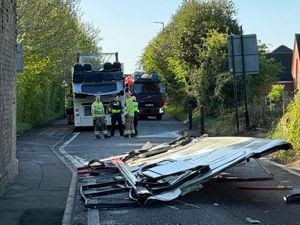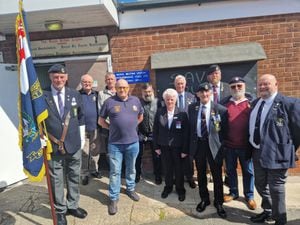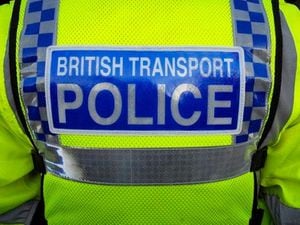Bumbling Boris breaks the mould
A messy blonde mane and a bit of a lumbering gait – nothing about Boris Johnson suggests 'global statesman'.
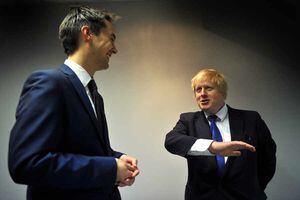
Yet there's something about this plummy-voiced, apparently bumbling Tory that has gathered a significant fan club even among those who normally show no interest in politics.
The Eton-educated Mayor of London refers to the Prime Minister simply as 'Dave'.
One could not imagine any front bench member of David Cameron's team being so impertinent. Somehow, Boris gets away with it.
He's probably the only front line politician who would not seem remotely self-conscious flipping pancakes as he was in the Premier Suite in Cannock, gleefully referring to himself as a 'tosser', while urging Conservative supporters to help get Cannock Chase constituency candidate Amanda Milling elected in May.

The mayor is seeking a return to the House of Commons himself, and plans to do two jobs until his current term as the capital's leader ends.
He is no stranger to the West Midlands. Nor has he lived his life in the Westminster bubble, as many politicians today have. Perhaps this is his secret.
For all his private education and time in the political world, he also spent time on the front line of life, meeting, interviewing and telling stories about people from vastly different backgrounds to his own.
In 1988, as a graduate trainee on The Times newspaper, he was sent to Wolverhampton to work for the Express & Star and learn his trade.
Longer-serving colleagues remember a young man who stuck out like a sore thumb in the newsroom, in wide-lapelled chalk stripe suits.
"It was 27 years ago or whatever it was," he says. "I was considerably junior to you today.
"I was a mere toenail in the Express & Star. I went around doing, you know, 'toddler locked in loo' and 'cat stuck up tree' stories. I used to do lots of UFO stories.
"They were so sweet. They always said 'no, Boris, no more UFOs'. They said they were a load of old b******* and I had to agree."
But there were also plenty of stories the Express & Star was interested in from the then-trainee reporter.
"These old boys would find what they claimed were Second World War munitions in their gardens, bits of old bomb and so on," he says. "I'd always go out and we'd take a photo of this guy who'd found a piece of old tin or something."
[youtube title="WATCH: Boris Johnson on his time living in Wolverhampton as an Express & Star reporter" ]
The subject swiftly changes, with Boris now deep in memory.
"Easter bonnet parades," he says. "I was really good at Easter bonnet parades."
It was here in the Black Country, he says, that he first realised he was a Conservative.
"But the thing I noticed was the damp and the mould and what it was like to be a council tenant.
"And these were people who were long term unemployed. And I remember feeling so sorry for them.
"Their lives weren't getting any better. They were living in this house and there would be a baby or other pressures on them. And they would complain about the damp and the mould and the council wasn't doing enough about it.
"And I felt this wasn't their property. It wasn't theirs to repair. It was up to the council to do it. It was council property.
"I just sort of felt, how much better would it be to try to get those people into work, get them off benefits, get them if possible to have a share in the value of their home or, if possible, to buy their home.
"And then they'd have the pride, the initiative, the sense of self-determination.
"And I thought maybe there is something in this whole right-to-buy.
"That was when I started to think sometimes socialism, with the best possible intentions, socialism can sometimes keep people, sort of, in a rut that they don't deserve or need to be in.
"That's when I migrated towards the Conservative way of thinking."
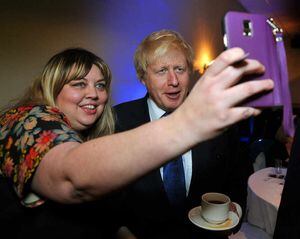
Boris lived at the time in Dimmock Street in Parkfields, lodging with a lady named Brenda whose surname he cannot recall.
We have, nonetheless, stumbled upon a found memory.
"Brenda! How do you know about her? I did keep in touch with her," he says, "but I went abroad and then lost touch.
"She was so wonderful. She used to make the most extraordinary meals in the evening.
"I was a trainee and so the paper, The Times, was paying for me to be there.
"They covered her expenses. She was such a sweet soul. She basically decided that they'd given her far too much money for this.
"All she had to produce was an evening meal. And so she used to produce the most colossal evening meal you have ever seen. And there would be lasagne and incredible dishes of cheese, butter and so on.
"I remember describing her meals as like a cardiac arrest.
"It was cheese, butter and cheese. She was lovely. Brenda from Dimmock Street, right by the abattoir. I can't remember her surname, I'm sorry, but she was very nice."
Boris starts to tell a story about a social worker he befriended but then gets distracted by a party press officer who explains time is running short.
There are various supporters queuing up for selfies with the larger-than-life mayor.
He has already been around all the tables, where supporters have been eating lunch, and posed for them like a rock star on the red carpet. But he is still in demand..
A charity campaigner, raising money for the Liverpool hospital Alder Hey Children's Charity, wraps Boris in a scarf. He is only too happy to oblige. A young party aide swoops in to remove the tag from it.
Throughout our interview, Boris has fidgeted, shuffled and rubbed his wild hair.
But all the time he has kept eye contact. He is, for all his traits, a professional and expert in communication.
His speech may be peppered with a few 'errs' and 'sort ofs' but he is clear about the sort of Tory that he is. Specifically, he is a One Nation Tory.
That concept has been adopted recently by Ed Miliband and Labour.
But it actually originated in the Victorian era with Benjamin Disraeli and the Conservatives.
Specifically, it is the idea that members of society owe a duty to one another.
Today, Boris equates it with businesses doing well from the economic upturn now needing to do their bit.
Normal
"I think the story of the West Midlands over the last few years and what's happening in Cannock is about private enterprise," he says.
"But it's private enterprise that's there not just to fill the wallets of the fat cat, but delivering for the whole country and everyone in society."
It is not that far removed from David Cameron calling for employers to give Britain a pay rise.
Boris belongs to a different class of politician. And though he may not be enamoured by the comparison, he shares many attributes with UKIP leader Nigel Farage – namely a career outside of politics first and very obvious and human weaknesses.
Mr Farage drinks and smokes. He is a bit posh himself but with his yellow corduroy trousers and his pint in hand he presents an image of a normal person, even if he is anything but.
It works the same way for Boris. They do not come much posher. But he comes across as flawed and, essentially, human. He is the sort of person that can get stuck on a zip wire or accidentally trip up a small child in a charity football match.
The Prime Minister would be hung out to dry if he did it. The public finds it endearing of Boris.
The biggest issue after the General Election for the Conservatives, if they lose, will be who succeeds David Cameron.
Some of Boris's fans enjoy his antics but would find it unthinkable that he would be one election away from Number 10.
But he's mayor of our capital city. Stranger things have happened.

